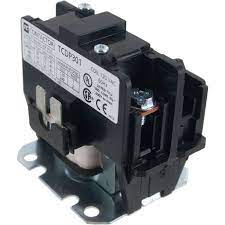WHAT IS AN HVAC CONTACTOR
An HVAC (Heating, Ventilation, and Air Conditioning) contactor is an electrical switch that controls the power supply to components in an HVAC system, typically the compressor and the condenser fan. It is an integral part of the HVAC system and plays a crucial role in regulating the flow of electricity to these components.
The contactor consists of a coil and a set of contacts. When an electrical signal is sent to the coil, it creates a magnetic field that pulls the contacts together, closing the circuit and allowing electricity to flow to the connected components. When the electrical signal is removed, the magnetic field dissipates, and the contacts open, interrupting the electrical flow.
In the context of an HVAC system, the contactor is often used to control the power supply to the compressor and the condenser fan motor. When the thermostat signals a need for cooling or heating, the contactor is activated, allowing electricity to reach the compressor and fan. When the desired temperature is reached or when the system is not in use, the contactor opens, cutting off power to these components.
Contactor failure is a common issue in HVAC systems, and when it occurs, it can result in the system not working properly. Signs of a faulty contactor may include the HVAC system not turning on, intermittent operation, or unusual noises. If there are issues with the contactor, it is advisable to have a qualified HVAC technician inspect and replace it if necessary
HOW TO TEST AN HVAC CONTACTOR
Testing a contactor involves checking its electrical functionality to ensure that it is opening and closing properly. Here are the steps you can take to test if a contactor is going bad:
Safety Precautions:
- Turn Off Power:
- Before performing any tests, turn off the power to the HVAC system at the circuit breaker to ensure safety.
Steps to Test the Contactor:
- Visual Inspection:
- Inspect the contactor visually for signs of wear, burning, or damage. Look for melted or burnt areas on the contacts.
- Check for Contactor Movement:
- Manually observe the movement of the contactor. When the system is activated, the contactor should make an audible click as it closes the circuit.
- Check for Voltage:
- Use a multimeter to measure the voltage across the contactor terminals. There should be voltage when the system is calling for heating or cooling. If there’s no voltage, it may indicate an issue with the control circuit or thermostat.
- Inspect Contacts:
- Check the contacts for signs of pitting, burning, or excessive wear. If the contacts look damaged, the contactor may need to be replaced.
- Test Continuity:
- Use the multimeter to test for continuity across the contactor’s contacts. When the contactor is activated, there should be continuity, indicating that the contacts are closed. When the contactor is not activated, there should be no continuity, indicating that the contacts are open.
- Check Coil Resistance:
- Measure the resistance across the coil terminals using the multimeter. Compare the measured resistance with the manufacturer’s specifications. If the resistance is significantly different, it may indicate a problem with the coil.
- Inspect Wiring:
- Examine the wiring connected to the contactor for signs of damage or loose connections. Faulty wiring can affect the contactor’s performance.
When to Replace the Contactor:
If any of the following conditions are met, it’s advisable to replace the contactor:
- Visible damage: If there are visible signs of burning, melting, or damage.
- Abnormal noises: If the contactor makes unusual noises during operation.
- Failure to close or open: If the contacts do not open or close properly.
- Incorrect resistance: If the coil resistance is significantly out of spec.
If you’re unsure about performing these tests or if you find any issues, it’s recommended to consult with a qualified HVAC technician for further inspection and replacement if necessary. Remember to always prioritize safety and turn off the power before attempting any tests or repairs.
WHO TO CALL
If you’re in central Kentucky, and having a problem with your HVAC system. Call The HVAC Outlet! One of our master licensed HVAC service partners can provide the proper assistance and guidance to solve your problem. Call us today! (859) 209 1112


